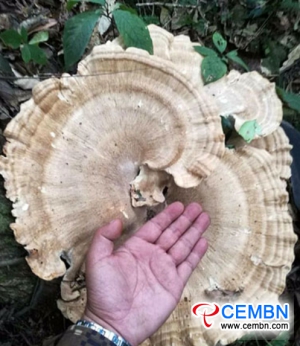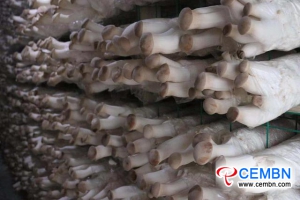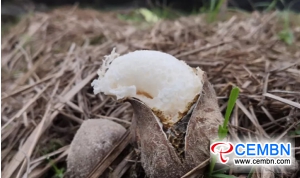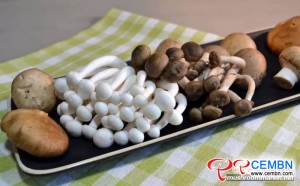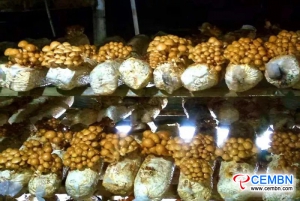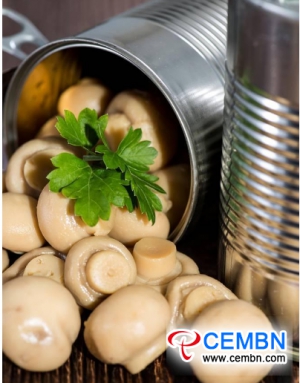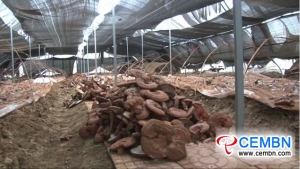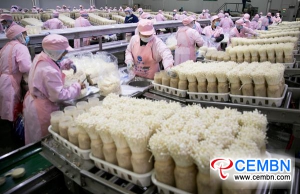
Mushroom Matter
Welcome on our platform. Why MUSHROOM MATTER? Because mushrooms play an important role in our lives as well in business. Our goal is to bring the world the very latest mushroom news with the upmost care to support the positioning of our beloved Mushroom.
On November 26, in National Natural Protection Area of Jing’an County, Jiangxi Province of China, a giant Bondarzewia dickinsii was found under the chestnut tree.
“The giant mushroom is yellow white, 6cm in height of stipe and 50cm in width of cap,” introduces related staff warmly, adding that in order to further get to know the giant stuff, Dr. Zhang Linping who works in Jiangxi Agricultural University was invited for professional guidance.
After half a month of observation and research on its appearance characteristics and micro-structure, the mushroom was finally categorized as Bondarzewia dickinsii which generally grows on stump of subtropical broad-leaf trees in China and Japan.
Over the years, mushroom industry has been the great lubricant for the development of regional economy in Luliang County, Qijing City, Yunnan Province of China. In 2017, gross area for mushroom planting reached 2.04 million square meters, gross mushroom output totaled 159,000 tons and output value hit 540 million CNY within the county, varieties include Oyster, Enoki, King oyster, Shiitake, Button, Stropharia rugosoannulata and Pleurotus cornucopiae while primary foreign exporting nations refer to USA and Southeast Asian.
“We daily output 10-20 tons of fresh King oyster mushrooms, which accounts for 70% of market volume of Yunnan Province. King oyster mushrooms produced in our base are green and pollution-free, they could be eaten raw right after the picking, and taste like abalone and almond,” said principal from one of King oyster mushroom bases in Damogu Town of Luliang County, going on that the base follows bag-mode cultivation craft so as to improve the efficiency and promote the easy management as well as the sustainable development of agricultural circular economy.
For social, economic and ecological benefits, mushroom planting also shows the following four advantages:
1. Mushroom planting is a labor-intensive industry, now, Luliang County holds over 680,000 of gross population, which indicates abundant and high-quality labor force for the development of mushroom industry.
2. Mushrooms are high in protein, low in sugar, salt and calorie. They are listed as Health Food by FAO.
3. Liliang County owns substantial biotic resources, according to statistics, each year, gross area for cultivation of rice and corn respectively totals 120,000 and 250,000 mu, through mushroom growing, agricultural wastes could be effectively reused.
4. Mushroom industry helps eliminate the pollution caused by burning of agricultural wastes and promote the development of agricultural circular economy. Organic fertilizers made by mushroom residues not only enhance the utilization efficiency of resources, improve the environment, but also response to the slogan of energy-saving, high-efficiency, and carbon emission reduction.
Now, in Shangrao County, Shangrao City, Jiangxi Province of China, Dictyophora indusiata mushrooms are breaking from “eggs”.
“Dictyophora indusiata is known as Bamboo fungus and it is praised as “The Queen of Mushroom” in China. Over the years, i am committed to artificial and wild-imitation cultivation of Bamboo fungus in the base, mu output on fresh Bamboo fungus reaches 1000 kg,” introduces Mr. Ding Xuelong warmly, going on that in his base, annual output on Bamboo fungus comes to 350-400 kg while annual sales volume hits 20 million CNY.
Dictyophora indusiata is categorized into medium-temperature variety, suitable temperature for the growth of mycelia is 4-28 degrees Celsius and the optimal range is 20-23 degrees Celsius. Dictyophora indusiata leads tardy growth tendency below 16 degrees Celsius or above 36 degrees Celsius.
Dictyophora indusiata is packed with abundant amino acid, vitamin and mineral salt, eating it often can nourish the body, boost the brain, tranquilize the spirit and strengthen the health. Wild Dictyophora indusiata widely distributes in Japan, India, Indonesia, USA, UK, Russia, Australia, Mexico, France and other nations. In China, it spreads in the provinces of Heilongjiang, Jilin, Shanxi, Jiangsu, Anhui, Hunan, Hubei and so on.
On November 13, The 19th World Mushroom Biology & Product Meeting was opened in Shanghai City, China. During the meeting, relevant expert reported the following interpretation on development status of China’s mushroom industry.
In 2017, gross mushroom output reached 36 million tons in China, which occupied 70% of global output.
Since 21th Century, Big Health Industry which includes mushroom industry has been gaining attentions. In 2010, global mushroom production mainly centred on developed countries. On aspect of annual mushroom output, US, Japan, Holland and Korea respectively hit 410,000 tons, 380,000 tons, 230,000 tons and 200,000 tons.
In the 1970s, mushroom industry started to rapid develop in China. In 1978, annual mushroom output totaled nearly 100,000 tons in China, which merely occupied 5.7% of that of global. However, in 2013, the number was fiercely increased to 31.70 million tons.
In addition to artificial mushroom production, China is also one of the nations that own abundant resources on wild mushroom in the world. Nowadays, there are over 2000 edible species, of which China masters above 900.
“Among 900 edible species found in China, there are 50 sold as commodities while above 20 hold certain production scales,” explains relevant expert.
As known to all, in America, mushroom production mainly features Button mushroom. Japan’s top mushroom varieties are King oyster, Shiitake, Hypsizygus marmoreus and Oyster mushroom. Korean famous mushrooms include Oyster, Shiitake, Enoki and Button mushroom while Button mushroom is always the characteristic variety in Holland, France, Spain and other European nations.
Moreover, China’s mushroom deep processing industry also launches Mushroom Powder, Crisp, Beverage, Essence, Salt and other products, stretching over industrial fields such as Agriculture, Medicine, and Health-care.
Ultimately, there is also short slab in China’s mushroom industry. Now, in Europe and America, Japan and Korea, industrialized (factory-mode) mushroom production has been realized to replace traditional growing pattern while China still seizes traditional mushroom farming, which implies low industrial concentration ratio and merely 10% of efficiency (90% in developed nations). Meanwhile, as consumers’ requirement tends to diversify, variety structure of China’s mushroom industry still awaits the optimization.
Growing Pholiota nameko can be a lucrative business
Recently, it is the harvest time of Pholiota nameko in Bianhuang Village, Qimeng Town, Guizhou Province of China.
Qimeng Town used to lead a tardy development speed on aspect of agriculture, over the years, under the leadership of local town party committee, villagers have been vigorously driven to embark on Pholiota nameko farming with the superiority of local natural resources and climatic conditions.
Pholiota nameko presents yellow and tan color, it is in golden color during the maturation period. In addition, Pholiota nameko holds good or even excellent taste and it is also a kind of health-care food that features low calorie and low fat.
Up to now, over 17,500 kg of Pholiota nameko have been output in Bianhuang Village, gross revenues hit at least 70,000 CNY.
In China, production of mushroom cans mainly gathers in Fujian, Liaoning, Shandong and Henan Province, Button mushroom is the top variety.
Nowadays, export market for canned mushroom is constantly expanding and showing the diversified trend. Over the years, China exports mushroom cans to over 180 nations and regions, it especially exploits the markets in ASEAN and along the One Belt One Road. In 2015, China exported 127,000 tons of mushroom cans to nations along the One Belt One Road, export value reached 160 million USD, which respectively accounts for 54% and 41% of that of China.
In 2015, China’s gross export on mushroom cans came to 237,000 tons, export value hit 390 million USD, of which canned Button mushrooms occupied 185,000 tons and valued 250 million USD.
Artificial planting of Reishi mushroom got succeeded
Recently, Reishi mushrooms artificially planted in Yunhe Base of Baihe Town, Fang County, Hubei Province of China are evolving into the maturation and workers are busy with the collection work of spore powder, which indicates the successful trial planting.
Spore powder of Reishi mushroom agglomerates the essence of Reishi mushroom, it is packed with all genetic material and health-care function of Reishi mushroom, thus gaining high medicinal values.
“By now, Reishi mushrooms cultivated in two sheds have yielded fruitful results, mu output on spore powder reaches 500 kg, Reishi mushrooms are processed or made into bonsais, slices and wines in accordance with shapes and sizes, products are quite preferred by consumers,” said principal of Yunhe Base.
Over the years, Siyang County, Jiangsu Province of China persists in taking high-efficiency mushroom industry as the holder that promotes the construction of new rural demonstration county, propels farmers to increase earnings, unswervingly pushes the moderate scale management of agriculture, especially highlighting the powerful support provided by local under-forest development pattern, and comprehensive utilization mode of mushroom residues. Up to now, Siyang County has become one of the largest industrialized mushroom bases in China.
“After years of development, up to now, we have built 19 mushroom bases, and enterprises engaging in industrialized mushroom production. Characteristic mushroom varieties cover Enoki, King oyster, Button, Straw and other 10,” said head of Siyang County with enthusiasm.
Nowadays, mushroom growing is seized as one of the leading industries that propel farmers to increase incomes and grow rich. In Siyang County, mushroom farming firmly provides 2800 stable jobs for growers, annual acquisition volume on straw, sawdust and other agricultural wastes comes to nearly 60,000 tons.












